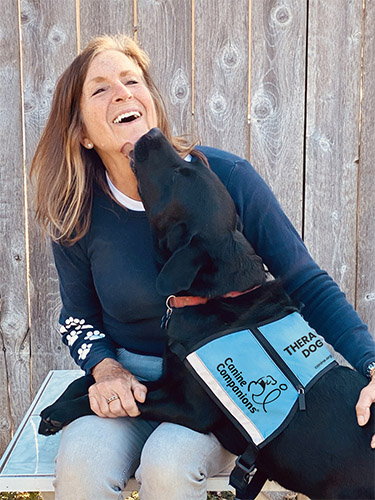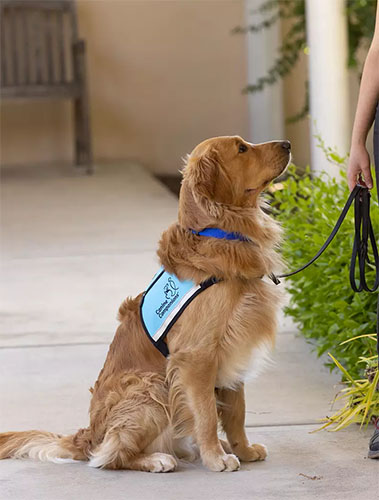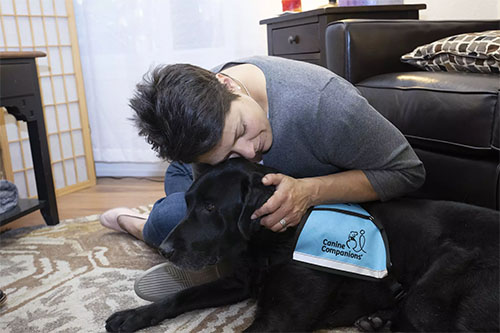Where To Get A Therapeutic Service Animal
Therapy Dogs
Learn more virtually our therapy dog certification pilot program.
Hither at Canine Companions, nosotros believe in the joyful, transformative power of the human-canine partnership – in every form! More than one-third of dogs released from service dog training have gone on to serve as therapy dogs in their communities. We recollect that'due south incredible, and we are proud that through our therapy dog certification pilot program, nosotros can proceed to back up and engage these volunteers while providing suitable released dogs with impactful jobs.
While our mission is to provide highly trained service dogs to people with disabilities, we believe the dogs released from our program tin still have an incredible ripple effect in the world through their work as therapy dogs. With this goal in mind, we have created this program to certify our amazing dogs to provide back up and comfort to members of their community.
A therapy dog is a pet that accompanies their owner into specific settings for the benefit of the residents or clients in the setting and/or as office of a therapeutic intervention. Studies take shown that interacting with therapy dogs as part of an animal-assisted intervention approach yields both physical and psychological benefits to humans and the domestic dog. Our therapy dog airplane pilot program will provide formal therapy domestic dog certification and ongoing support for eligible teams in specific regions with the goal of expanding the program more broadly in the time to come.
All Canine Companions dogs receive extensive temperamental and medical evaluations, and dogs selected for this program must be approved by our skillful staff in both our national veterinary and training departments. Only a small number of dogs that qualify for the program will be bachelor to those that were not the dog's volunteer puppy raiser.
The Canine Companions Therapy Dog Certification Program is an American Kennel Club (AKC) recognized program. Teams that are certified through this program are eligible to receive AKC Therapy Dog titles.

Therapy dogs are invited in certain settings to increase the well-being of clients, residents, and students. They are well-nigh usually found at hospitals, schools, and nursing homes too every bit in private therapy settings. Except in those specifically approved settings, the therapy dog is otherwise considered a pet canis familiaris and has no special public access rights.
Outside of approved facilities, bringing the therapy canis familiaris into public places where pet dogs are not normally allowed is confronting program policy. Canine Companions reserves the correct to revoke the certification of any therapy canis familiaris handler found in violation of this policy.
No national standards exist for the training of therapy dogs; nevertheless, New York Governor Cuomo directed the commissioner of the department of agronomics and markets to convene a working group to examine the need for statewide standards for therapy dogs. We used their findings to guide the formation of our program. Canine Companions strives to agree our therapy dog program to a high standard of excellence despite the lack of national standards.
Dogs chosen for therapy domestic dog teams take passed numerous behavioral and health screenings to ensure they are condom and comfortable around various people to whom they may provide comfort. All dogs participating in the program must be canonical by our expert staff in both our national veterinary and preparation departments.
Handlers go through an application and interview process before being approved to participate in the program and must complete coursework and preparation specific to therapy dog work, including passing written and in-person examinations while working with Canine Companions staff and volunteer evaluators. They must demonstrate professionalism and be able to safely intendance for and manage the therapy dog in a diverseness of dissimilar settings and effectually different people. In all work, handlers are required to abide by Canine Companions' Lawmaking of Ethics.
Finally, through our certification process, our therapy dog teams are AKC Canine Adept Citizen certified and must demonstrate suitability through the applied test.
As defined by the Americans with Disabilities Deed (ADA), service dogs piece of work for a handler with a disability and are individually trained to perform specific tasks that mitigate the symptoms of that person'due south disability. Service dogs accept public admission rights, meaning that they are permitted to back-trail their handler who has disabilities anywhere that is open to the public, even places that do not permit pet dogs.
In dissimilarity, a therapy dog is a pet that accompanies their owner into specific settings for the benefit of the residents or clients in the setting and/or as part of a therapeutic intervention. Therapy dogs are not necessarily trained in specific tasks, nor are they working for the do good of their handler. Aside from specific settings where they accept blessing to perform therapy dog work, they may not be taken into public places where pet dogs are not permitted. Canine Companions vests and bandanas are only to be worn when doing therapy dog work.
Facility dogs are expertly trained dogs who partner with a facilitator working in a wellness care, visitation, or pedagogy setting. These dogs tin perform over 40 commands designed to motivate and inspire clients with differing needs. Their facilitators are committed to long-term employment where they straight serve clients with special needs a minimum of twenty hours per week. Facility dogs don't accept public access rights like service dogs.
Therapy dogs are frequently released from our service domestic dog plan for various reasons that brand them inappropriate for service dog work. They are considered pet dogs who beloved engaging with people and have the temperament appropriate for therapy dog work. They are not necessarily trained in specific tasks nor are they working specifically for the benefit of their handler. They also exercise not have public admission rights like service dogs.
For more information, visit our facility dog data page here.
A therapy canis familiaris may provide comfort at a vaccine clinic, in a classroom, or for our first responders. Depending on our dogs' preferences and the clients' needs, therapy dogs may sit or lie next to a client, read with them, take a walk with them, or play a game of fetch. A well-mannered and highly engaged therapy dog encourages feelings of calm and security for clients. There are many ways that therapy dogs aid their clients!
There is a $100 initial certification fee and a $30 annual recertification fee. This fee includes liability insurance coverage and pays for the Canine Companions logo belong or bandana, issued at the time of certification. Canine Companions offers therapy canis familiaris teams support services free of charge.
For people adopting a therapy dog, there is a $1000 therapy dog adoption fee (waived for the puppy raiser of the dog). The same fees every bit in a higher place also utilize at the time of certification.
Dogs that are eligible for the therapy canis familiaris plan must be from Canine Companions.
Eligible types of dogs include:
- Released dogs over one year of age
- Retired breeders
- Retired service and facility dogs
- Agile graduate dogs at least 1-yr post-placement, with additional approval from the graduate department and their personal veterinarian.
- Agile male breeders at to the lowest degree 6 months post-placement, with additional approval from the convenance and veterinary departments.
Due to health and safety concerns, agile female breeders are not eligible to participate in this program. All dogs participating in the plan must be approved by the veterinarian and training departments as medically and temperamentally suitable for therapy dog work.
Health: Dogs in the therapy dog program are required to exist upwards to date on vaccines, at a healthy weight, on monthly preventatives, receiving almanac veterinary exams, and should not participate if they are ill.
Temperament: Dogs in the therapy dog program should be social, manageable, and advisable for the setting(s) where they volition be working. Dogs may have conditions to their certification based on their release reasons that must exist adhered to for the duration of their certification with us. Examples are fear of children, surface sensitivity, and toileting concerns.
In the Northwest Region (Santa Rosa, CA):
Canine Companions is simply offering this pilot plan to owners of eligible Canine Companions dogs who alive within 100 miles of our headquarters in Santa Rosa, California. If you lot meet these requirements, click here for more data.
In the Southwest Region (Oceanside, CA):
Canine Companions is only offering this pilot programme to handlers of eligible Canine Companions dogs who live inside 200 miles of our campus in Oceanside, CA. If you meet these requirements, click hither for more information.
In the South Primal Region (Irvine, TX):
Canine Companions is only offer this pilot programme to handlers of eligible Canine Companions dogs who are already performing therapy dog work in their communities and who live within 200 miles of our campus in Oceanside, CA. If you lot meet these requirements, click hither for more than information.
Canine Companions makes therapy dog certification bachelor to owners/guardians of eligible dogs (run into Eligibility). Handlers may be dual certified with other organizations but should be enlightened that other organizations may non permit dual certification.
We recognize that individual programs and facilities may have policies that prevent the Canine Companions therapy dog certification programme from beingness the best fit.
Where To Get A Therapeutic Service Animal,
Source: https://canine.org/assistance-dogs/our-dogs/therapy-dogs/
Posted by: suttonyoule1997.blogspot.com

 To exist eligible for certification as a therapy canis familiaris handler, applicants must:
To exist eligible for certification as a therapy canis familiaris handler, applicants must: Canine Companions seeks eligible volunteers to administer the preparation and evaluation for therapy canis familiaris teams in the field.
Canine Companions seeks eligible volunteers to administer the preparation and evaluation for therapy canis familiaris teams in the field.
0 Response to "Where To Get A Therapeutic Service Animal"
Post a Comment